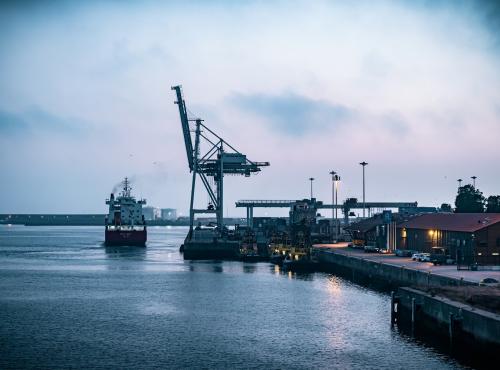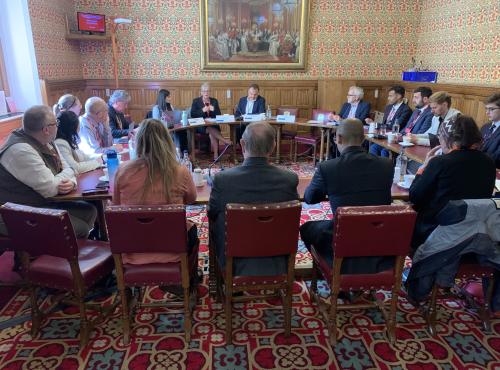Pipeline to 2050: Building the foundations for a harmonised heat strategy
Policy Connect and Carbon Connect are proud to launch their latest report: Pipeline to 2050 - Building the foundations for a harmonised heat strategy.
Following up on our report Uncomfortable Home Truths: why Britain urgently needs a low carbon heat strategy, Pipeline to 2050 sets out recommendations for BEIS’ forthcoming Heat and Buildings Strategy. Based on the findings of five roundtables held between January and July 2020 with cross-party parliamentarians, policy-makers and experts from industry, academia and non-governmental organisations, the publication calls for a joined-up approach that simultaneously addresses all aspects of heat decarbonisation.
The report highlights that today, there is a patchwork of heat policy initiatives. Although they might incentivise positive development, in themselves are nevertheless too dispersed and not enough to drive the level of coordinated action that is needed given the complexity of heat decarbonisation. Setting out propositions to tackle challenges associated with the transition to low carbon heat in the areas of governance, funding, innovation and public engagement; the publication calls for a Heat and Buildings Strategy that shows a step change in terms of ambition for heat decarbonisation.
The report recommends that the Heat and Buildings Strategy needs to put forward a systematic approach that joins up all policy aspects and principles needed for the transition to low carbon heat. Moreover, given the cross-sectoral engagement needed between consumers, industry, research and various levels of the government, it argues that the Strategy has to be constructed in a way that simultaneously catalyses action from all stakeholders that are needed to take part in the process for effective heat decarbonisation.
The report foreword is signed by Lord Duncan of Springbank, former Minister for Climate Change, and Alan Brown MP, Energy and Climate Change spokesperson, who said:
‘The decarbonisation of domestic heating will be the holy grail of the government’s Net Zero strategy. Unlike other aspects of decarbonisation, the question of heating is literally a matter for every household. It will be an arduous journey; there are different routes, different costs and different timescales. It is for that reason that this report, focusing upon a heat strategy that puts us on track to reach net zero, is so timely and so vital.'
Lord Duncan of Springbank – former Minister for Climate Change
“Energy efficiency is crucial to stopping carbon emissions from our buildings. I am proud to be part of this report, which rightly reiterates that decarbonising our heating systems must go hand in hand with energy efficiency, which should be treated as a national infrastructure project in its’ own right. The government needs to harmonise the measures needed for a well-managed transition to low carbon heat that delivers warm homes for everyone.”
Alan Brown MP – Energy and Climate Change Spokesperson
The Carbon Connect advisory board have shared their thoughts:
“While the market is not capable of making the strategic decisions about what needs to be done for heat decarbonisation, it is capable of delivering change if it is supported with clear structures and a long-term approach. Therefore, government needs to set the long-term strategy for heat decarbonisation and give the market the long-awaited policy signals based on which it can start delivering change. The challenge of heat decarbonisation will be with into the next decades, and therefore it’s important that heat policy is formed with cross-party consensus to guarantee long-term policy credibility to consumers and industrial actors. Backed by cross-party parliamentarians, this report provides a helpful guide in this process.”
Dr Keith MacLean OBE: Managing Director – Providence Policy
The low carbon heat transition is not going to happen without getting the public on board. We have to start engaging people in this transition and helping them make the changes that are necessary in their homes. It is also essential that citizens have a voice in local and national decisions about how heat decarbonisation will be implemented.
Professor Jim Watson: Professor of Energy Policy - UCL
“Innovation is crucial to help us reach net-zero in the heating sector by 2050. It’s the key to developing the new technological solutions, consumer propositions and business models that are needed to enable a transition to low carbon heat. Government and regulators must provide a consistent and long-term approach to innovation that is reflected in the strategic direction for heat policy. Together with robust innovation funding, this is fundamental to incentivise the supply chain for innovation in the long-run.”
Sarah Deasley: Director – Frontier Economics
Roundtable sponsors SSE also said:
SSE Enterprise strongly supports the need for place-based decarbonisation strategies and an enhanced role for local authorities who should be empowered to identify the most appropriate low carbon heating solution based on local conditions, including resource availability and density of loads. A ‘heat zoning’ approach should be endorsed by the Government and trialled with real urgency”
Jody Pittaway: Heat Sector Director - SSE



